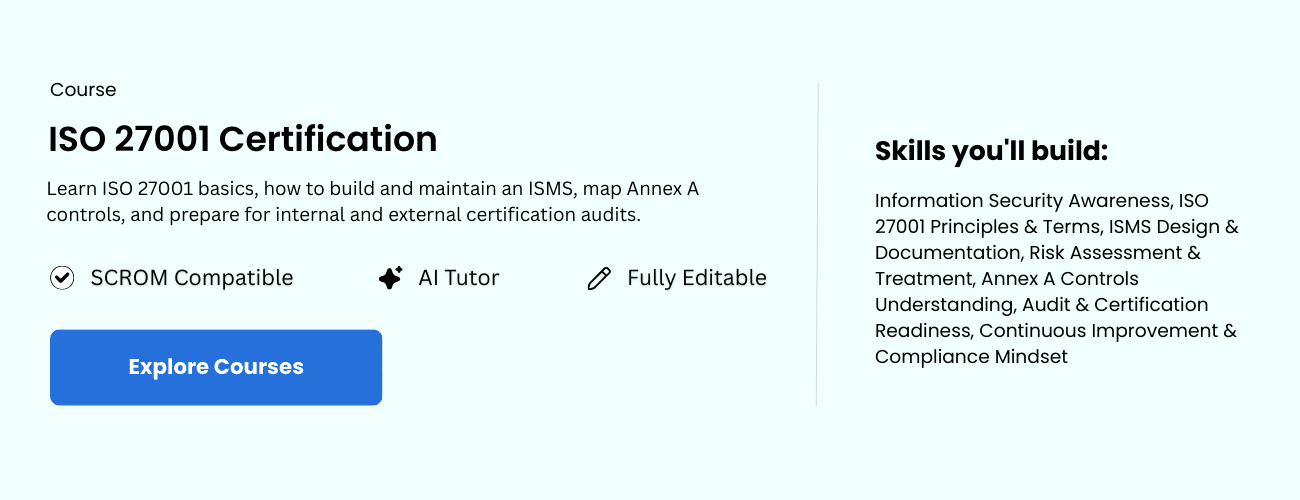Introduction: Why ISO 27001 Certification Matters in Today’s Digital World
Understanding ISO 27001 – The Foundation of Information Security
ISO 27001 is an internationally recognized standard designed to establish, implement, maintain, and continually improve an organization’s ISMS. Its primary goal is safeguarding sensitive data through a systematic approach to managing security risks, thereby building stakeholder trust and ensuring compliance with legal frameworks.
Purpose of ISO 27001
The core purpose is to provide organizations with a structured framework to identify security threats and apply appropriate controls. It emphasizes a risk-based approach, allowing organizations to tailor their defenses according to their specific needs and context.
Benefits of Implementing ISO 27001
- Enhanced Security: Systematic risk management improves protection of sensitive information.
- Regulatory Compliance: Meets legal requirements, reducing penalties and legal exposure.
- Customer Trust: Certification signals reliability, strengthening client relationships.
- Operational Efficiency: Standardized processes streamline security management.
- Incident Preparedness: Readiness reduces damages from security incidents.
Latest Trends in ISO 27001 Implementation
Today’s organizations increasingly integrate ISO 27001 with other frameworks like ISO 27701 and ISO 22301, creating comprehensive security ecosystems. Cloud security controls are a focus, with controls expanding to address cloud-specific risks. Automation and AI are enhancing real-time threat detection and monitoring, while supply chain security is gaining prominence. To support clearer benchmarking, many teams also compare ISO 27001 vs SOC 2 requirements when designing unified compliance roadmaps, ensuring controls align with both security and audit expectations. Adoption of ISO 27001 is also aligned with evolving data protection laws such as CCPA and the EU AI Act, ensuring organizations remain resilient amid growing complexities.
Step-by-Step Guide to ISO 27001 Certification Course for Beginners
Starting your certification journey involves several stages—from initial preparation to continuous improvement. Here’s a roadmap to help you navigate this process effectively.
1. Preparing for the Certification Course
Define your goals clearly. Research reputable training providers, ensuring they are accredited and recognized within the industry. Gather foundational knowledge and identify prerequisites to ensure you’re ready for more advanced content. Create a study plan with realistic timelines and resource allocation.

2. Core Topics Covered in the Certification Course
Courses typically include risk assessment methodologies, control implementation, documentation standards, and auditing procedures. Hands-on activities and case studies help translate theory into practice, preparing you for real-world application.
3. Practical Skills and Certifications You’ll Gain
Expect to acquire skills in risk management, control selection, policy development, and audit execution. Certifications such as ISO 27001 Lead Implementer or Lead Auditor validate your expertise and boost employability.
4. Post-Course Certification and Implementation
After certification, apply your knowledge to establish or improve your organization’s ISMS. Engage in ongoing training, monitor compliance, and adapt controls as standards and threats evolve. Continuous improvement ensures long-term certification maintenance and relevance.
Leveraging Your ISO 27001 Certification for Career and Business Growth
Achieving ISO 27001 opens numerous avenues for professional advancement and business expansion. Demonstrating expertise attracts new clients, builds trust, and positions you as a security industry leader.
Career Opportunities with ISO 27001 Certification
Roles like ISMS Manager, Security Consultant, and Auditor are highly valued. Certification validates your skills, enabling eligibility for strategic positions that influence organizational security decisions.
Real-World Case Studies and Success Stories
Organizations across various sectors—financial, healthcare, technology, and government—have reported reduced security incidents, increased stakeholder confidence, and market expansion after adopting ISO 27001. These success stories illustrate how certification acts as a catalyst for growth and trust.
Emerging Trends & Future of ISO 27001 in Cloud and AI
The integration of cloud services and AI into organizational operations requires evolving ISO 27001 controls. Standards are adapting to include cloud security best practices, AI governance, and privacy considerations, ensuring organizations manage risks effectively while embracing innovation.
Conclusion: Your First Step Toward Becoming an ISO 27001 Expert
Embarking on your certification journey is a strategic decision that enhances your skills, credibility, and career prospects. By understanding the standards, selecting the right training, and applying your knowledge diligently, you position yourself as a valuable security professional.
Continuous learning, staying abreast of industry trends, and practical application are key to long-term success. Start today—your path to becoming an ISO 27001 expert begins with that first step.












